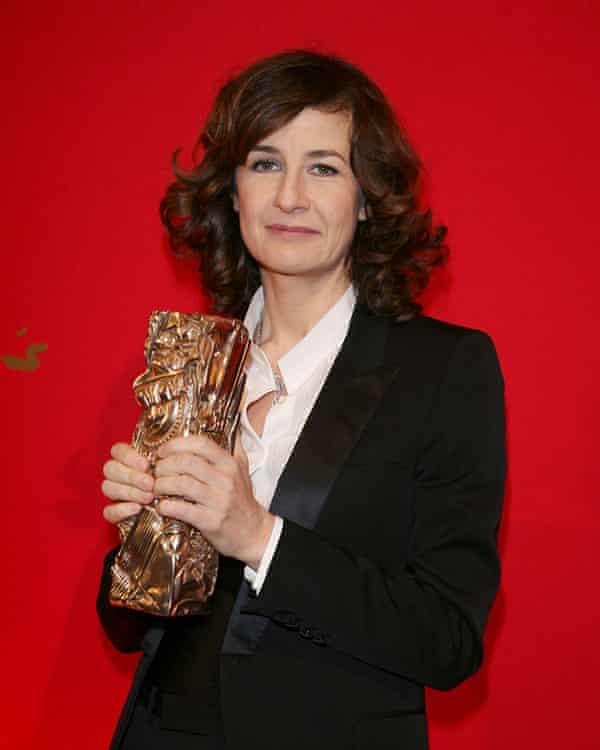
‘Lots of great actors are not exactly oil paintings’: Valérie Lemercier on her ‘horrifying’ Céline Dion biopic | Céline Dion
One of the words used most often to describe French actor and comedian Valérie Lemercier is “kooky”, but even that fails to fully encapsulate the plain weirdness of her latest film, Aline, just released in the UK.
In this imagined biopic of singer Céline Dion, Lemercier, 58, plays the Canadian superstar at all ages, even a child, baffling and unsettling critics (the Guardian described it as “horrifying”).
Lemercier cannot see what the fuss is about. “I really wanted to play her as a child and why not? I’m always playing children in my shows so it seemed perfectly normal, though it might seem a bit bizarre outside France,” she says.
Not as bizarre as it could have been. Lemercier says she also shot a scene with her face superimposed on to a baby to portray the newborn Aline. To her regret, and perhaps audience relief, this ended up on the cutting room floor. “My producer begged me to take it out so I did,” she says ruefully. “We had great fun creating this illusion of youth.”
Lemercier is a big name in France, where she is best known for playing what they call fofolle – dippy, off-the-wall characters. She has had seven long-running theatre productions, including one-woman shows, has won two Césars, the French Oscars, for best supporting actress, and three Molières, the theatre equivalent. She acts, sings, dances, writes screenplays, directs and has made three singles with other artists, as well as her own album.
On its release last November, Aline was hailed by French critics as “magnificent” and “jubilant and very touching”, and lauded as the actor’s best film to date, no faint praise given Lemercier has made 36 films.
International reviews have been less reverent: at the 2021 Cannes film festival last July, American critics described the movie as variously “truly weird”, “kooky as hell” and “strange”. (Aline is due for release in the US next month.)
The film follows the rise of the plain but talented French-Canadian Aline Dieu, who dreams of becoming a famous singer. The teenage Aline – the youngest of 14 children of humble origins – is discovered by a musical producer 26 years her senior, who propels her to international stardom with the help of serious dental work and dance classes (and with whom she falls in love and marries later in the film).

The opening disclaimer that “this film is inspired by the life of Céline Dion. It is, however, a work of fiction” is disingenuous – this is Dion’s life story. The superstar singer was discovered by manager mentor René Angélil when she was 12, and she married him aged 26 in 1994 in a lavish ceremony in which Dion wore a Swarovski crystal headdress weighing 3kg; this is also a scene in Aline. Four years after their wedding Angélil was diagnosed with throat cancer. He died in 2016.
Lemercier has never met Dion and did not have her approval before or since making the film. The nearest she has come to Dion is brushing past her in a backstage corridor. The screenplay was written after research and Lemercier says “a certain distance” was probably a good thing for the film, though she says she did try to contact the star.
“As soon as I finished writing the scenario the first thing I did was to show it to [Dion’s] French manager, who read it very quickly and told me she could see that it wasn’t mocking and that I really liked her. I needed to know that someone in Céline’s entourage had seen that this film was well-meaning.”
When we meet in September last year she does not know if Dion has seen the film. “I contacted Céline Dion’s manager in Quebec who told me that maybe Céline would see it one day but she was not interested in it. So who knows?” The singer’s family have since made it clear they do not like Aline.
“If I was her I’m not sure I’d be rushing to see it, but I hope the message did get through to her because I just want her to know that this film is a tribute.”
The Lemercier-Dion likeness is uncanny and mesmerising. Lemercier has reproduced Dion’s animated mannerisms, gestures and the famous Quebec accent. Lemercier also heroically lip-syncs her way through Dion’s musical repertoire, performed in the film by the French-Italian singer Victoria Sio.
Our meeting has been set for midday in the chic tea room of the Park Hyatt Vendôme Paris hotel, when Lemercier calls to say she is running late. Her taxi app has crashed so her press attache suggests that as she is not far away perhaps she could walk. The answer is no, perhaps explained by the fact that when Lemercier arrives she is sporting what looks like a cross between fancy Birkenstocks and furry slippers.
In person, apart from the footwear, Lemercier is far less eccentric than her reputation suggests. She is the cliched “funny girl”: hilarious in the spotlight; disarmingly earnest out of it, responding to questions like an exam candidate searching for the right answers, which are often left hanging unfinished with a “voilà!”.
Part of her fascination with Dion steps from parallels between the star’s early life and her own, including the belief that neither of them “would win a beauty contest … I know full well that I have an odd physique and it’s true that I didn’t feel I was a pretty little girl because nobody ever told me I was. I’ve always been bien dans ma peau [comfortable in my skin], but I’m a realist,” she says. “It must have been the same for Céline when she was young. There’s a scene in the film when someone makes a joke that she has an odd face and is not very graceful, and I think Céline must have reflected on that. In the beginning she had all this hair, uneven teeth, a big nose. She must have also known [that she wasn’t pretty] …

“For me, for any young person of 18 years starting out as an actor, of course it’s better to be a beauty – but it’s not a beauty contest and lots of great actors are not exactly oil paintings.” She adds: “I was a lot in this character. One cannot make a film that is not about oneself, that doesn’t speak about one’s own person, one’s own body. I wanted to put a bit of me in it. It was part of me, too.”
Lemercier, the second of four daughters, says that, like Dion, she grew up in a large family. “Both my grandmothers had nine children each, so it was not unusual to have 150 people at the table for family reunions. I was two years old when I remember making my family laugh and I recall the feeling of great joy that came from it.”
At 18, she left school, which she hated, and came to Paris with 1,000 francs (about £100) her father had given her. She took a series of temporary jobs, including working at the perfume counter in the Galeries Lafayette department store, which gave her material for standup shows. Her break came when she was offered a role in the comedy television series Palace.
Dion is not the first real person whose life Lemercier has fictionalised. The 2005 comedy Palais Royal!, which she also directed, was very loosely based on the life of Diana, Princess of Wales.
“Though it was mostly filmed in England with English money, it never came out in the UK. It was years before The Crown and back then not many people made the link with Diana in France because people didn’t know too much about her life. But it was clear to me.”

We quickly establish that Lemercier’s private life is off limits. She has never married, has no children, but is “not alone”; that is as much as I can squeeze out of her. Later she briefly alludes to a fiance, but won’t give a name. She enjoys cooking, has visited Japan 26 times, does “a bit of sewing” and says she loves reading but has no time. “I’ve always so many irons in the fire. It’s been a while since I read a book and I’m sad about that.”
While she is reticent talking about herself, Lemercier appears to have been able to use Aline to exorcise some personal ghosts. Throwaway remarks in interviews suggest the film allowed her to be “the child I never was” and might explain her wanting to play Dion at all ages. But perhaps the most poignant signal – and divergence between fact and fiction – is the mother-daughter relationship. Dion is close to her mother, played in Aline as a feisty character anxious to protect her child by the Canadian actor Danielle Fichaud.
Lemercier does not enjoy a close relationship with her mother and says with a nonchalance that seems forced that her parents are “not much interested” in her career. “My mother doesn’t watch the television and didn’t even know I’d won a Molière. I think a friend told her the following day. She’s not ashamed, but it doesn’t interest her. She’s not at all a mother hen like Céline’s mother; quite the opposite,” she says.
“I would have liked her to be otherwise, but she was, how can I say, less present. But I am very close to my sisters and we have a certain solidarity between us to make up for our mother’s absence.”
Lemercier’s forte, for which she is best known in France, is the one-woman show. “I like being the centre of attention. I know you’re not supposed to and when you’re young and you stand for election as the class student representative, they always tell you not to vote for yourself. But why not? I was brought up with the idea that you mustn’t draw attention to yourself, that you should be discreet, not be too flashy, not wear too much makeup. I was 10 years old when I signed a note to my mother promising never to wear makeup, and today I can spend two hours in hair and makeup before going on stage.”
She is currently on stage in Paris in a three-person comedy that runs until the end of May, but is excited about Aline’s release in the US, dismissing the snobbery that exists in French culture over America. “Of course Hollywood interests me. I’m not an intellectual. Not at all. So it’s great news the film is coming out in the States,” she says. “I love American cinema and I’d love to be a Hollywood star. It would be nice to live in a big house and have my own dressmaker living in a small house next door. If I was richer I’d have someone making all my dresses and that would be my luxury – better than a private jet or personal cook or staff.”
